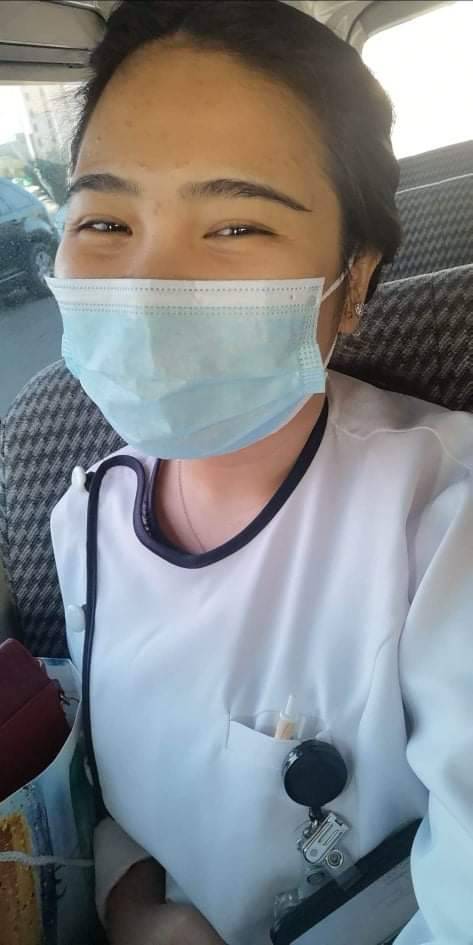More than just an Overseas Filipino Worker

A strong-willed, 26-year-old Filipina, Kate Gonzales has been a health worker in the Kingdom of Saudi Arabia for almost three years.
Physicians, nurses, and other hospital workers are overwhelmed by endless streams of patients and extra-long hours. Healthcare workers are the most valuable resource for health, and society should be taking good care of people like them and thanking them for fighting an unseen battle.
It is not the dollars or the money. Her passion, commitment, and calling to heal and family on the other side of the world are her fuel to conquer what Covid-19 pandemic or challenges she experienced.
Kate's heart is very close to children; she has nieces that inspire her to do more, she said.
She is the only girl in their family. After she graduated in nursing from Our Lady of Fatima University, she went to the Kingdom of Saudi Arabia for almost three years now without any relatives or friends to live with.
Kate has found a Filipino group of nurses that also works there and gives her a second family to lean on.
Finding great friends in the country that she migrates with is like a gem. It helps her quickly adapt to the culture and beliefs in Saudi Arabia, a country on the Arabian Peninsula in Western Asia. She can adapt to how the government is cultured with different ideas.
Kate shared that working as a nurse has been hard for her whole life, but it is extra challenging for her when a pandemic happens.
She also discusses the challenges she has faced, feelings of loneliness, burnout, and different types of stress in her field of work.
"The Covid-19 pandemic has sustained professional and personal effect on me as a nurse, high risk for burnout and stress merely because of the kind of field of work I have,” she said.
Mental and psychological stress, overload of the patient, especially during the pandemic burst, and insufficient staffing are other factors.
“The virus also affects us, which we are afraid because of the need to isolate, we cannot go to work; thus, lesser the staff and help demand is increasing,” she narrated.
Kate comes across the challenges in working in the hospital in Jeddah, a city in the Hejaz region of Saudi Arabia and the country's commercial center.

She is having a hard time dealing with the different healthcare technology tools that are not physically available in the Philippines and updating traditional medicine to an advanced type of healthcare for each patient.
Despite those experiences and challenges, she has to face them alone. She has become more optimistic. The guides that professionals gave to help them in their everyday life as a nurse are praiseworthy.
She dares to withstand conservative countries that have differences in religions and beliefs.
These things do not hinder Kate to pursue her calling to heal. She can adapt to how the country is cultured with different beliefs, traditions, and practices.
"Self-help techniques and physical self-care like sleep and hobbies are needed. Positive attitudes and techniques reduce the negative effects of work and stress, especially in hospitals,” she said. “With so much stress and emotions from a patient and patients' family are to be endured with an open mind.”
Kate is a great provider in their family but treating other people makes her anxious because her mother needs medical attention too.
She endures the challenge of living alone miles away from a family and it hurts for her to see that she cannot take good care of her mother.
She hopes that she can provide more for her family. One day, she will stay at her mother's side and be able to give her the care that she has given to Arabs.
She is one of the modern-day heroes who fight with the current situation—the pandemic.
The efforts and challenges she had experienced may bring inspiration to others.
Indeed, millions of people around the world are on the move, trying to adapt to life in different of the world.
Overseas Filipino Workers (OFWs) and healthcare workers' sacrifices did not prize with money or luxury kinds of stuff. The medical professionals are on the frontlines without the protection and protocols they need to survive.
"Getting a chance to work overseas is an opportunity that does not come easy to everyone. And being an OFW is not permanent, so we need to keep our priorities straight, save up, invest for our future and keep taking care of mental health until the day we return to our family and country,” Kate said.
Kate had gained that taking care of mental health is what matters the most.
“To provide for our family, we must be able to provide for ourselves first. Being a health worker is not an easy-peasy task. It is about saving people's life behind those scalpels and injections that they need to do in someone's life that is in their hands,” Kate said. - Carmela Nina P. Apat
Radio Veritas Asia (RVA), a media platform of the Catholic Church, aims to share Christ. RVA started in 1969 as a continental Catholic radio station to serve Asian countries in their respective local language, thus earning the tag “the Voice of Asian Christianity.” Responding to the emerging context, RVA embraced media platforms to connect with the global Asian audience via its 21 language websites and various social media platforms.














